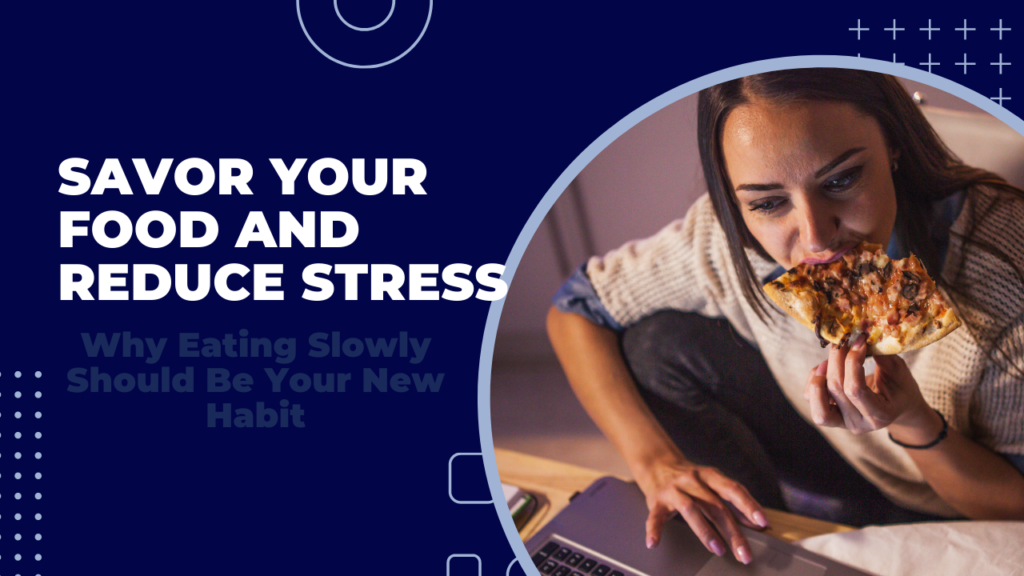Finding Balance, Happy 1/2 Hour, ML Bailey Consultants, News and Support
Savor Your Food and Reduce Stress – Why Eating Slowly Should Be Your New Habit
Introduction:
In our fast-paced modern lives, it’s not uncommon to find ourselves rushing through meals without a second thought. Whether we’re eating on the go, multitasking while we eat, or mindlessly devouring our food, the habit of eating quickly can have significant negative effects on our health and well-being. In this blog post, we’re going to explore the importance of slowing down and savoring our food, not just for our physical health but also for reducing stress and promoting mindful eating.
Welcome to REAL Social Workers Online Magazine
This is the place for social workers to Relax, Empower, Advocate and Learn.
I am Marcyline Bailey, a licensed clinical social worker with close to 30 years of experience. I created “Stress Talk” to help women over 40 live healthy lives through strategic stress management and solution focused self-care.
So, why share this on a blog for social workers. According to Zippia 83.9% of licensed social workers are women. The average age of employed social workers is 44.
If you enjoy this content, please like, follow and subscribe to mlbaileyconsultants on Facebook, Instagram and YouTube. Also, please share with colleagues and friends.
These are the benefits of eating slower and how to do it easily.
Lowers the Risk of Obesity:
Did you know that it takes approximately 20 minutes for our brain to realize that our stomach is full or satisfied? When we eat too quickly, we’re likely to consume more food than we need before our brain can send the “fullness” signal. As a result, over time, this habit can lead to weight gain and an increased risk of obesity-related health issues. By eating slowly and giving our brain enough time to catch up with our stomach, we can eat less and consume smaller portions, which is beneficial for maintaining a healthy weight.
Better Digestion:
Brian St. Pierre, MS RD, of Precision Nutrition provides a concise explanation in his article All about Eating Slowly. Here is a summary.
Digestion is a complex process that begins even before we take the first bite. When we see, smell, or think about food, our body starts preparing for digestion by releasing saliva. This saliva contains essential enzymes that help break down the food and moisten the mouth for easier swallowing. When we eat too quickly, we deprive our bodies of this crucial preparatory step, leading to less efficient digestion.
By adopting the habit of eating slowly, we allow our bodies the time it needs to complete each stage of the digestion process. This includes the proper breakdown of food by stomach acid, the rhythmic muscle contractions (peristalsis) that move food through the digestive tract, and the absorption of nutrients.
Improved digestion not only reduces the likelihood of experiencing issues like heartburn and bloating but also ensures better nutrient absorption for overall health.
How to Begin?
Now that we understand the benefits of eating slowly, let’s explore some practical tips by experts in the field on how to make it a part of our daily routine:
- Use a timer: Set aside around 30 minutes for each meal to avoid rushing and to give yourself ample time to enjoy your food.
- Chew thoroughly: Aim to chew each bite for 15 to 30 seconds, depending on the texture of the food. Chewing well aids in the breakdown of food, making it easier for your digestive system to work as it should.
- Sip water between bites: Drinking water while eating can help you feel fuller and more satisfied, preventing the temptation to rush through your meal.
- Put your fork down: After each bite, put your fork down on the table. This simple act helps you become more mindful of your eating pace and encourages you to savor the flavors.
- Designate time for meals: Avoid distractions like phones, computers, or the TV during meals. Create a calm and focused environment for eating.
- Use smaller plates and utensils: Choose smaller dishes and utensils to help control portion sizes and to trick your mind into feeling satisfied with less food.
- Include high-fiber foods: Foods rich in fiber take longer to chew and digest, naturally slowing down your eating pace.
Conclusion:
In conclusion, making the shift to eating slowly and savoring our food can have positive effects on our physical and mental well-being. By taking the time to enjoy each meal mindfully, we can reduce the risk of obesity, improve digestion, and develop healthier eating habits. Let’s prioritize our health and happiness by adopting this simple yet impactful habit.
If you found this blog post helpful, I invite you to watch the episode or listen to the podcast.
Also be sure to like, follow, and subscribe for more valuable content. Happy, slow eating!
I invite you to listen to Season 3 Episode 23 of the podcast or watch the livestream replay.
M.L. Bailey Consultants helps women live healthy lives through strategic stress management and solution focused self-care.
Learn about us

